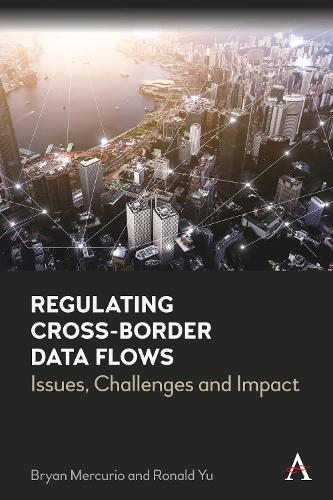
Regulating Cross-Border Data Flows: Issues, Challenges and Impact
(Paperback)
Publishing Details
Regulating Cross-Border Data Flows: Issues, Challenges and Impact
By (Author) Bryan Mercurio
By (author) Ronald Yu
Anthem Press
Anthem Press
16th August 2022
United Kingdom
Classifications
Professional and Scholarly
Non Fiction
International law: communications, telecommunications and media
Intellectual property law
384.3
Physical Properties
Paperback
162
Width 153mm, Height 229mm, Spine 26mm
454g
Description
Data is now one of the worlds most valuable resources. The adoption of data-drivenapplications across economic sectors has made data and the flow of data so pervasive thatit has become integral to everything we as members of society do from conducting ourfinances to operating businesses to powering the apps we use every day. For this reason,governing cross-border data flows is inherently difficult given the ubiquity and value of data,and the impact government policies can have on national competitiveness, businessattractiveness and personal rights. The challenge for governments is to address in acoherent manner the broad range of data-related issues in the context of a global data-driven economy. This book engages with the unexplored topic of why and how governmentsshould develop a coherent and consistent strategic framework regulating cross-border dataflows. The objective is to fill a very significant gap in the legal and policy setting by considering multiple perspectives in order to assist in the development of a jurisdictionscoherent and strategic policy framework.
Reviews
This book paints a rich picture of the issues policymakers should address when regulating
cross-border data flows. A must-read for all those interested in governance processes in a
global data-driven economy. Enrico Bonadio, Reader in Intellectual Property Law City,
University of London, UK.
The book by Mercurio and Yu provides invaluable insights into the dynamics of the data-
driven economy. Building upon a deep understanding of the existing regulatory frameworks
and the geopolitical powerplays, the authors charter the way forward for a coherent
regulation of cross-border data flows as the lifeblood of our societies. PROF. DR.IUR.
MIRA BURRI, Chair for International Economic and Internet Law, Managing Director
Internationalization, Principal Investigator ERC Consolidator Grant: TRADE LAW 4.0 (2021-
2026), University of Lucerne, Switzerland.
The professional and diverse academic backgrounds of the two authors have ensured not
only the quality of the output but also the unique perspectives of the discussion throughout.
The book aims to provide an answer to the challenges of the new economy, it took a holistic
approach in examining the pros and cons of the current framework and proposes an interest-
based solution. Dr. TianxiangHe, School of Law at the City University of Hong, China.
This book distinguishes itself from the existing one in at least two aspects. For one, it is
written by Hong Kong legal academics--HK is a global hub for various data-driven
applications, and the HK government has been on the frontline of rolling out new regulatory
approaches governing data-related issues. Hong Kongs policies can inform other
jurisdictions; moreover, its unique status as related to the Greater China Area, too, makes
Hong Kong experience as a & quot; smart city " an attractive case study. For another, the authors
have strong backgrounds in patents/IPRs; this is a very important yet less explored angle in
the context of data governance. This book should be read by all scholars, policymakers and
lawyers who are keen to capture the dynamics of law and data-driven technologies in Hong
Kong, the hub of the most dynamic markets in Asia. Dr. Han-Wei Liu, Senior Lecturer,
Monash University, Australia.
Author Bio
Bryan Mercurio is the Simon F.S. Li Professor of Law at the Chinese University of Hong Kong.
Ronald Yuis Director at Arctic Aurora Advisory Services and co-designer of TARID NFT risk assessment system
